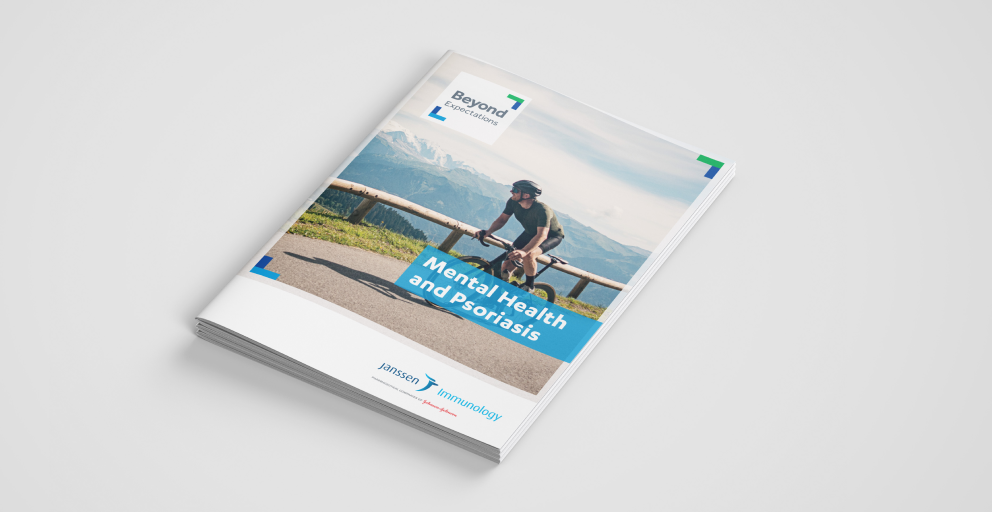Look after your mental health
Look after your mental health

It’s common to feel frustrated or overwhelmed,1 and your wellbeing and quality of life may be affected.2
If you feel self-conscious or embarrassed about your skin,1 it might make you avoid social situations or keep you from getting on with your daily life.2
In fact, if you have psoriasis, studies show there is a good chance you might also suffer from depression, anxiety and stress.1
If these symptoms go unrecognised and untreated, they can prevent you from effectively managing your PsO, which could affect both your physical and mental health.1
Stress can even affect how well you respond to treatment, trigger flare-ups or make the PsO worse.1
To learn more about the impact of psoriasis on your mental wellbeing
check out the Living with Psoriasis episode of the PsO Let’s Talk Psoriasis series here
Watch out for the signs
While anyone may struggle with their psychological wellbeing, it’s more likely for people with long-term health conditions,1 and there is a link between depression and PsO23 Signs to watch out for include:
- Trouble sleeping4
- Feeling sad or hopeless4
- Low energy4
- Loss of interest in things4
- Difficulty concentrating5
A low mood may improve after a short while, but if you feel this way for most of the day, every day, for more than 2 weeks, please see a doctor4 and if you’re having suicidal thoughts, please seek immediate help. While it can be tricky to speak about your feelings, general practitioners and specialist consultants will be able to offer you support or direct you to where you can access it.4
The Little Book
of Big Conversations
of Big Conversations
Helping you to start talking about depression

Don’t feel daunted reaching out - general practitioners are often the first health professionals people contact about mental health6
Remember you’re not alone
Over the duration of disease
- Approximately 50% of PsO patients report feeling rejected and stigmatized as a result of their condition7
- Approximately a third of people with PsO have depression8
- 37% of people felt their relationships had deteriorated as a result of their PsO9
- Over 37% of PsO patients have experienced suicidal thoughts10 - if you're having suicidal thoughts, please seek immediate help
- Over 50% of PsO patients struggle to sleep11
- People with PsO have higher rates of environmental risk factors, including smoking, alcohol use, obesity and sedentary lifestyles2
The effect of PsO is personal

The connection between chronic illnesses and mental health conditions is well documented,1 but even though these challenges are common in illnesses like PsO,1 they vary from person to person and don’t always correlate with psoriasis severity.12,13 For example, one person may find a small PsO plaque on their face or genitals to be far more upsetting13 than someone else who has large plaques on their back.14
Remember, no matter how severe your psoriasis, or where it is on your body, it’s just as important to manage your mental health, and seek help when you need it, as it is to manage your PsO treatment.
Think about opening up
- Have the conversation in a setting that makes you feel safe and relaxed
- Choose to speak to someone who you feel comfortable and safe with
- Talk while doing something else with your loved one, for example, going for a walk or a drive
- Ask a healthcare professional to join the conversation – or help you prepare for it – to provide guidance and a neutral point of view
- Have several short conversations instead of trying to explain everything in one go

Maintaining good relationships can be difficult at the best of times, but adding a long-term condition like psoriasis into the mix may make things even more complicated. This guide aims to give practical advice on how to navigate different types of relationships when psoriasis is part of the picture.
8 steps to managing your mental health

Obesity and weight gain have been identified as significant risk factors for PsO,1 which could contribute to your stress levels.1 Exercise is a great way to manage these risk factors, as it helps to keep your weight in check,14 boosts your mood by releasing endorphins15 and lowers inflammation, which could help ease your symptoms.14
If exercise is tricky, then meditation or mindfulness, spending time doing something you enjoy, or talking openly with your friends and family, may all help your state of mind.1

People with PsO who get social support – be it from friends, family, co-workers, or even from fellow patients on a forum – feel better day-to-day and are less likely to have depression.1 Read our Psoriasis and relationships guide, or take a look at the Connecting with others section for more advice on speaking to the people in your life.

When you’re feeling low, you might find it easier to deal with the mental health implications of your PsO if you stop worrying about the future and the hurdles you might face. Try to focus on the present moment, rather than the bigger picture.16

You might know a lot about PsO already, but whether you’re an expert or someone who’s just found out about psoriasis, keep yourself educated with the latest news and what’s on the horizon. You can find more about currently available treatments in our What treatments are out there section.

A life-long condition like psoriasis can make some people feel as if they’re not in control.11 With the right support and treatment, your physical and mental health can be managed. If your condition improves, your depression could too,1 so take your treatment as your doctor or dermatologist has prescribed and go back to them if you aren’t getting the results you want.

Being outside, even on a cloudy day, exposes you to light, which could help reset your biological clock and help you sleep better.17 Better quality sleep can help improve your mental health, and light therapy is also used to treat both mood disorders18 and psoriasis.19
Do be careful though, as over-exposure to sunlight could make your condition worse, so it is important to wear sunscreen, including on any psoriasis plaques - speak to your doctor about which sunscreen to use.19 It’s also important to consult your doctor on the appropriate amount of time to spend in direct sunlight,1 especially as certain psoriasis treatments can make you more sensitive to the sun.19

Visiting forums or patient organisation websites where you can speak to others with PsO and hear from people who have struggled in the same way that you have, may help you feel less alone. In Europe, a good starting point is EUROPSO, a patient advocacy group for all European country-level groups. You can use the website to find local groups as well as valuable tools and information on how to manage the condition.

Everyone has times where they feel a bit low, but depression is different,1 and anyone can experience it.1 If you suffer from a long-term condition like PsO, this could increase your risk of depression,1so if your low mood has lasted two weeks or more, if you’re struggling to handle your daily life, or you’re finding it impossible to enjoy the activities you used to love, it could be a sign that you’re depressed.20
Make an appointment to see a doctor so that they can prescribe you treatment for depression, if appropriate, and advise you on other measures that could help.16 These may include different types of talking therapy:16
- Cognitive behavioural therapy (CBT), which focuses on how your thoughts and beliefs affect your feelings and behaviour and helps you to develop coping mechanisms and retrain your reactions.21
- Interpersonal therapy (IPT), which helps people with depression who may have difficulties relating to or interacting with others, by working through relevant aspects of relationships.21
- Counselling, which involves the counsellor listening to you talk about your difficulties without judgement or criticism, to provide insight and help you find your own solutions to problems.21
Some medical treatments for mental health may cause PsO symptoms to flare,22 so it’s important to ask your healthcare professional for guidance

Psoriasis can have a deep impact on the people who live with the condition. This patient guide aims to provide useful advice to help people with psoriasis manage their mental health.
You may be interested in

There isn't a one-size-fits-all with psoriasis treatment - your doctor can help.

Everyone’s different, but you may recognise the classic signs.

Advice about dealing with the main psoriasis symptoms.
